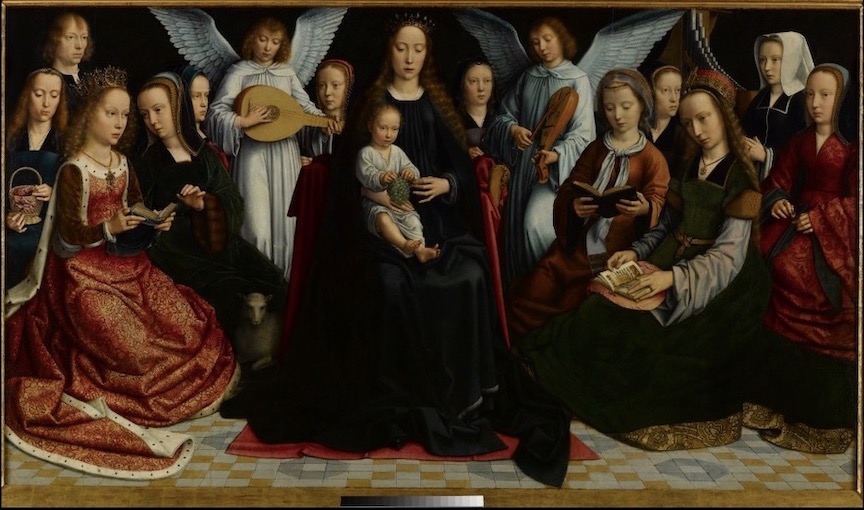Fr. Thomas Weinandy recently wrote a sobering article on this site in which he concluded: “I believe it will be the laity who bring about the needed purification. . . . More specifically, I believe it will depend mostly on faithful and courageous Catholic women.” Cardinal Robert Sarah in his new book, The Day Is Now Far Spent, also speculates that “women have a special role to play” in helping priests dedicate themselves “radically to God.” Perhaps, as Pope Francis has declared, this is the “Age of the Laity.” But I have my doubts.
If we laity are the ones to fix this mess, then just how can we do it, having no institutional power in Church politics? Are we simply to use the power of the purse to force wayward bishops “back in line”?
That is no true solution to this problem, although recent financial reports suggest that Peter’s Pence may be suffering in its annual revenues, which no doubt will get the attention of Rome.
The two laymen’s forcible removal of the wooden fertility statues from the church of Santa Maria in Traspontina ought to be a serious wake-up call to the Vatican bureaucracy regarding the steps some laity are willing to take in response to a sense of outrage and powerlessness. The removal of the statues temporarily resolved a problem, but clearly cannot resolve The Problem.
The burden of a rebirth for the Church seems unfairly to have been put on the shoulders of the laity, especially given that most lay Catholics have been poorly catechized in Catholic schools and parishes – see the recent Pew study, which found that almost 70 percent of Catholics do not believe in the Real Presence.
Yet the laity also seem too quick to point fingers at weak and silent bishops and fault them for every problem the Church experiences. We blame our priests and bishops for their sins and weaknesses, but how many Catholic laity fail in living their own daily lives in accord with Christ and His Church’s moral teachings?
How can we sheep ask so much of our shepherds when we are not willing to be living examples of Christ to the world ourselves? How can our shepherds ask anything of the sheep that they are not willing to model first for us?
A mutual acceptance of the burden of rebuilding the Church needs to be made by each and every member of the Body of Christ, whatever their vocation. It is not a duty only for laypersons, nor for religious alone.
Perhaps we are moving into a time of great destruction in which the institutional Church as we have known it for over a millennium will crumble, as happened after the fall of Rome and the conquest by Germanic tribes.

Yet even if waves of destruction sweep over us, we will hold on to the flame of faith not merely through the hierarchical structure of the Church, but through domestic catechism and underground networks, like the ones that the Catholic faithful in Elizabethan England created despite official persecution.
Blessed Fulton Sheen declared in 1974 that we were entering the fourth fall and rise of the Church in which our great test will be to resist the “spirit of the world.” Yet he was undaunted: “these are marvelous days in which to be alive. I thank God that I can live in these days, because these are days of testing.”
All the faithful must thank God that we have been chosen for these times to preserve and convey to new generations the essential nature of our faith, which is joy, but the joy that comes through rejecting our own will and accepting God’s will and plan for our lives. Virtus tentamine gaudet! Strength rejoices in the challenge.
That is what we face today. While we may find ourselves echoing Frodo’s complaint in Tolkien’s Lord of the Rings, “I wish it need not have happened in my time,” we must heed Gandalf’s response: “So do all who see such times. But that is not for them to decide. All we have to decide is what to do with the time that is given us.”
So what are we laity to do? We cannot – however appealing the idea – throw out weak and wayward shepherds, but we do have the real power of prayer and personal holiness. St. John Henry Newman’s motto cor ad cor loquitur, “heart speaks to heart,” must be one each of us laymen and women takes as our own.
We must teach the joy of the faith first and foremost in the secret recesses of our families, because, as Mother Teresa famously said, peace begins in the home. We must live this peace and its fruit, joy, at home, and from the sanctuary of our home, emerge as witnesses of joy to all those we meet in our daily lives.
I have three young children, the oldest of whom will receive her First Holy Communion in the Spring. My husband and I will prepare her and our sons, as well as we possibly can, for the tribulations they will face in our world, by teaching them the joy of the faith.
I may not feel great joy in being a Catholic right now, but I know the truth the Catholic Church safeguards – and in that truth lies the joy. What is this joy but the truth that we are sons and daughters of the triune God; that we are the people He loved so much that He sent his only Son to suffer and die that we might have eternal life with Him in heaven.
*Image: The Virgin among the Virgins by Gerard David, 1509 [Musée des Beaux-Arts, Rouen, France]
















